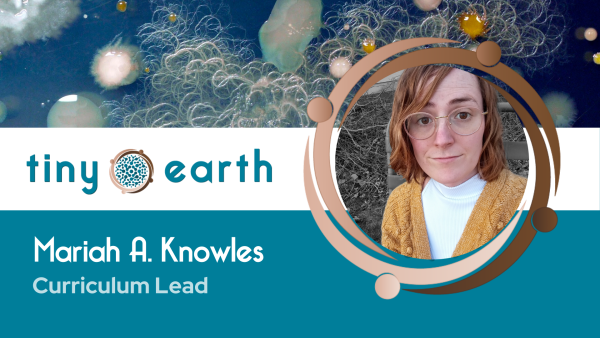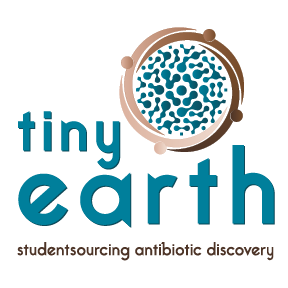 This past January, Mariah A. Knowles joined the Tiny Earth team as the new Curriculum Lead, transitioning from her former role as a Facilitator at the Wisconsin Institute for Discovery’s Data Science Hub. As a self-described “Swiss army knife,” she looks forward to leveraging her broad skill set and experiences, including a decade of teaching experience and curriculum design to revamp Tiny Earth curricula with an emphasis on anti-racism, justice, equity, diversity, and inclusion (AJEDI) principles in mind.
This past January, Mariah A. Knowles joined the Tiny Earth team as the new Curriculum Lead, transitioning from her former role as a Facilitator at the Wisconsin Institute for Discovery’s Data Science Hub. As a self-described “Swiss army knife,” she looks forward to leveraging her broad skill set and experiences, including a decade of teaching experience and curriculum design to revamp Tiny Earth curricula with an emphasis on anti-racism, justice, equity, diversity, and inclusion (AJEDI) principles in mind.
Mariah’s journey to curriculum and instruction began at Western Kentucky University, where she received her Bachelor’s degree in Computer Science with a minor in Professional Writing in 2014 and Master’s degrees in Computer Science and English Rhetoric and Composition in 2016 and 2018. While in Kentucky, she taught a variety of Computer Information Technology courses at Kentucky Community & Technical College System. Given that a majority of her students were her senior, she gained new perspectives on teaching and connecting with different student audiences. Humbled by her experiences teaching at a community college, she is currently pursuing a Ph.D. in Library and Information Sciences with a minor in Education Policy Studies and expects to graduate Summer of 2024. By completing this Ph.D., Mariah seeks to advance her professional development as an educator.
Under the leadership of Dr. Alan Rubel at UW-Madison’s School of Computer, Data & Information Sciences, Mariah’s work primarily focuses on data ethics with an emphasis on Artificial Intelligence (AI) education. While studying the teaching of AI ethics, she aims to demonstrate honesty, integrity, and best practices—ensuring that her students effectively utilize and produce powerful tools without sacrificing ethical considerations in society. Additionally, Mariah worked on various projects related to merging statistical and qualitative methods for student data and game-based assessment. Through this research, she translated and applied lessons from data science and AI ethics to her teaching pedagogy intending to make student learning more equitable.
A notable experience for Mariah was as a Teaching Assistant for a First-year Interest Group (FIG) at UW-Madison. In one instance, for example, two Black students brought her attention to the erasure of Black stories in scientific literature, which built on Mariah’s conversations with students about damage- vs. desire-based framings of marginalized communities in research. It is moments like this that have enlightened Mariah’s perspective as an instructor, stressing the importance of representation of diverse perspectives in science curricula. Throughout her work as an educator, Mariah takes a student-centered and social justice-centered approach to teaching.
“I refuse to do anything where I can’t bring all of myself into it.” — Mariah A. Knowles
Mariah looks forward to leveraging both her personal and academic experiences in her new role as the Curriculum Lead with particular attention to AJEDI principles, ethics, and mortality. Incorporating her identity as a trans woman into her work is also non-negotiable for Mariah, which broadens her scope on curricula, instruction, and how she views data. By utilizing her perspective as an underrepresented member of the STEM field, she has gained valuable insight into what environment and resources students need to learn and succeed.
“Rather than having the perspective of a microbiologist in my role with Tiny Earth, I would like to have the perspective of the students learning Tiny Earth.” — Mariah A. Knowles
Since onboarding at Tiny Earth, Mariah has joined the Scientific Teaching Course team and will support the development of the core modules and AJEDI activities. She also collaborates with TEPI, Dr. Josh Pultorak, to pilot and test a new Tiny Earth classroom data collection tool while getting a frontline view of how Tiny Earth research functions in action. In working with TEPIs, Mariah aims to reach instructors who have not yet grasped or implemented AJEDI by emphasizing the essence of these principles beyond face value. She encourages Tiny Earth stakeholders to not “get married to the five letters,” but rather use it as a foundation to support student learning outcomes in the classroom. Mariah emphasizes how the “letters” might change in the future, but the concept behind them will persist.
The level of leadership required in this new role is one of many challenges that Mariah is eager to tackle, alongside learning microbiological techniques and how students collect and disseminate data in the classroom. Mariah brings determination and a diverse range of skills to the Tiny Earth table and will start by wrapping up existing projects before checking off the network’s slew of curricular “wish list” items. And just like our students and TEPIs, she hopes that her work contributes to discovering the next new antibiotic!
Welcome to the team, Mariah!
—Melis Baskaya (Tiny Earth Communications & Media Intern) & Trang Tran (Tiny Earth Outreach Specialist)

